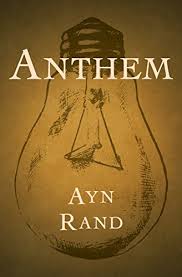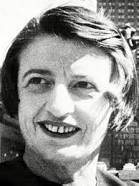Anthem Page #6
Anthem is a dystopian fiction novella by Russian-American writer Ayn Rand, written in 1937 and first published in 1938 in the United Kingdom. The story takes place at an unspecified future date when mankind has entered another Dark Age.
that International 4-8818 would not betray us, and Union 5-3992 would not understand. So we looked straight upon the Golden One, and we saw the shadows of their lashes on their white cheeks and the sparks of sun on their lips. And we said: “You are beautiful, Liberty 5-3000.” Their face did not move and they did not avert their eyes. Only their eyes grew wider, and there was triumph in their eyes, and it was not triumph over us, but over things we could not guess. Then they asked: “What is your name?” “Equality 7-2521,” we answered. “You are not one of our brothers, Equality 7-2521, for we do not wish you to be.” We cannot say what they meant, for there are no words for their meaning, but we know it without words and we knew it then. “No,” we answered, “nor are you one of our sisters.” “If you see us among scores of women, will you look upon us?” “We shall look upon you, Liberty 5-3000, if we see you among all the women of the earth.” Then they asked: “Are Street Sweepers sent to different parts of the City or do they always work in the same places?” “They always work in the same places,” we answered, “and no one will take this road away from us.” “Your eyes,” they said, “are not like the eyes of any among men.” And suddenly, without cause for the thought which came to us, we felt cold, cold to our stomach. “How old are you?” we asked. They understood our thought, for they lowered their eyes for the first time. “Seventeen,” they whispered. And we sighed, as if a burden had been taken from us, for we had been thinking without reason of the Palace of Mating. And we thought that we would not let the Golden One be sent to the Palace. How to prevent it, how to bar the will of the Councils, we knew not, but we knew suddenly that we would. Only we do not know why such thought came to us, for these ugly matters bear no relation to us and the Golden One. What relation can they bear? Still, without reason, as we stood there by the hedge, we felt our lips drawn tight with hatred, a sudden hatred for all our brother men. And the Golden One saw it and smiled slowly, and there was in their smile the first sadness we had seen in them. We think that in the wisdom of women the Golden One had understood more than we can understand. Then three of the sisters in the field appeared, coming toward the road, so the Golden One walked away from us. They took the bag of seeds, and they threw the seeds into the furrows of earth as they walked away. But the seeds flew wildly, for the hand of the Golden One was trembling. Yet as we walked back to the Home of the Street Sweepers, we felt that we wanted to sing, without reason. So we were reprimanded tonight, in the dining hall, for without knowing it we had begun to sing aloud some tune we had never heard. But it is not proper to sing without reason, save at the Social Meetings. “We are singing because we are happy,” we answered the one of the Home Council who reprimanded us. “Indeed you are happy,” they answered. “How else can men be when they live for their brothers?” And now, sitting here in our tunnel, we wonder about these words. It is forbidden, not to be happy. For, as it has been explained to us, men are free and the earth belongs to them; and all things on earth belong to all men; and the will of all men together is good for all; and so all men must be happy. Yet as we stand at night in the great hall, removing our garments for sleep, we look upon our brothers and we wonder. The heads of our brothers are bowed. The eyes of our brothers are dull, and never do they look one another in the eyes. The shoulders of our brothers are hunched, and their muscles are drawn, as if their bodies were shrinking and wished to shrink out of sight. And a word steals into our mind, as we look upon our brothers, and that word is fear. There is fear hanging in the air of the sleeping halls, and in the air of the streets. Fear walks through the City, fear without name, without shape. All men feel it and none dare to speak. We feel it also, when we are in the Home of the Street Sweepers. But here, in our tunnel, we feel it no longer. The air is pure under the ground. There is no odor of men. And these three hours give us strength for our hours above the ground. Our body is betraying us, for the Council of the Home looks with suspicion upon us. It is not good to feel too much joy nor to be glad that our body lives. For we matter not and it must not matter to us whether we live or die, which is to be as our brothers will it. But we, Equality 7-2521, are glad to be living. If this is a vice, then we wish no virtue. Yet our brothers are not like us. All is not well with our brothers. There are Fraternity 2-5503, a quiet boy with wise, kind eyes, who cry suddenly, without reason, in the midst of day or night, and their body shakes with sobs they cannot explain. There are Solidarity 9-6347, who are a bright youth, without fear in the day; but they scream in their sleep, and they scream: “Help us! Help us! Help us!” into the night, in a voice which chills our bones, but the Doctors cannot cure Solidarity 9-6347. And as we all undress at night, in the dim light of the candles, our brothers are silent, for they dare not speak the thoughts of their minds. For all must agree with all, and they cannot know if their thoughts are the thoughts of all, and so they fear to speak. And they are glad when the candles are blown for the night. But we, Equality 7-2521, look through the window upon the sky, and there is peace in the sky, and cleanliness, and dignity. And beyond the City there lies the plain, and beyond the plain, black upon the black sky, there lies the Uncharted Forest. We do not wish to look upon the Uncharted Forest. We do not wish to think of it. But ever do our eyes return to that black patch upon the sky. Men never enter the Uncharted Forest, for there is no power to explore it and no path to lead among its ancient trees which stand as guards of fearful secrets. It is whispered that once or twice in a hundred years, one among the men of the City escape alone and run to the Uncharted Forest, without call or reason. These men do not return. They perish from hunger and from the claws of the wild beasts which roam the Forest. But our Councils say that this is only a legend. We have heard that there
Translation
Translate and read this book in other languages:
Select another language:
- - Select -
- 简体中文 (Chinese - Simplified)
- 繁體中文 (Chinese - Traditional)
- Español (Spanish)
- Esperanto (Esperanto)
- 日本語 (Japanese)
- Português (Portuguese)
- Deutsch (German)
- العربية (Arabic)
- Français (French)
- Русский (Russian)
- ಕನ್ನಡ (Kannada)
- 한국어 (Korean)
- עברית (Hebrew)
- Gaeilge (Irish)
- Українська (Ukrainian)
- اردو (Urdu)
- Magyar (Hungarian)
- मानक हिन्दी (Hindi)
- Indonesia (Indonesian)
- Italiano (Italian)
- தமிழ் (Tamil)
- Türkçe (Turkish)
- తెలుగు (Telugu)
- ภาษาไทย (Thai)
- Tiếng Việt (Vietnamese)
- Čeština (Czech)
- Polski (Polish)
- Bahasa Indonesia (Indonesian)
- Românește (Romanian)
- Nederlands (Dutch)
- Ελληνικά (Greek)
- Latinum (Latin)
- Svenska (Swedish)
- Dansk (Danish)
- Suomi (Finnish)
- فارسی (Persian)
- ייִדיש (Yiddish)
- հայերեն (Armenian)
- Norsk (Norwegian)
- English (English)
Citation
Use the citation below to add this book to your bibliography:
Style:MLAChicagoAPA
"Anthem Books." Literature.com. STANDS4 LLC, 2025. Web. 10 Mar. 2025. <https://www.literature.com/book/anthem_329>.








Discuss this Anthem book with the community:
Report Comment
We're doing our best to make sure our content is useful, accurate and safe.
If by any chance you spot an inappropriate comment while navigating through our website please use this form to let us know, and we'll take care of it shortly.
Attachment
You need to be logged in to favorite.
Log In